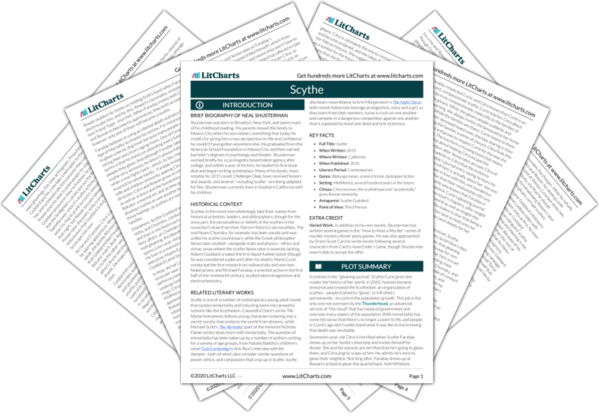The Thunderhead—a sentient, all-knowing version of the Age of Mortality "cloud"—symbolizes the best and the worst elements of humanity. The Thunderhead is impartial, kind, and does the work of caring for the entire population by spearheading public works projects and policing infractions. However, the Thunderhead’s oversight abilities only go so far since it's forbidden from interfering with anything related to the Scythedom, which is supposed to be self-policing. In this way, the Thunderhead mirrors the way in which the immortal humans of Scythe have become both godlike in that they can't die naturally and don't experience pain or suffering, while also remain, in a number of important ways, shockingly and vulnerably human. Immortal humans, and the Thunderhead, cannot control humanity's worst impulses and grabs for power as represented and carried out by select scythes, particularly Scythe Goddard.
Thunderhead Quotes in Scythe
Chapter 5 Quotes
When it was decided that people needed to die in order to ease the tide of population growth, it was also decided that this must be the responsibility of humans. Bridge repair and urban planning could be handled by the Thunderhead, but taking a life was an act of conscience and consciousness. Since it could not be proven that the Thunderhead had either, the Scythedom was born.
Chapter 7 Quotes
"But people could read it. The Scythe Archive is open to everyone."
"Yeah," said Rowan, "like the Thunderhead. People can read anything, but no one does. All they do is play games and watch cat holograms."
Chapter 8 Quotes
He clicked on each name and brought up four pictures. He immediately regretted it, because the moment those names had faces, they became people instead of parameters.
Chapter 15 Quotes
The Scythedom uses the Thunderhead for countless tasks—but to us, it's simply a database. A tool, nothing more. As an entity—as a mind—the Thunderhead does not exist for us.
And yet it does, and we know it.
Estrangement from the collective consciousness of humanity's wisdom is just one more thing that sets scythes apart from others.
Chapter 28 Quotes
Would the Thunderhead grieve our passing, I wonder? And if so, would it grieve as the child who has lost a parent, or as the parent who could not save a petulant child from its own poor choices?












